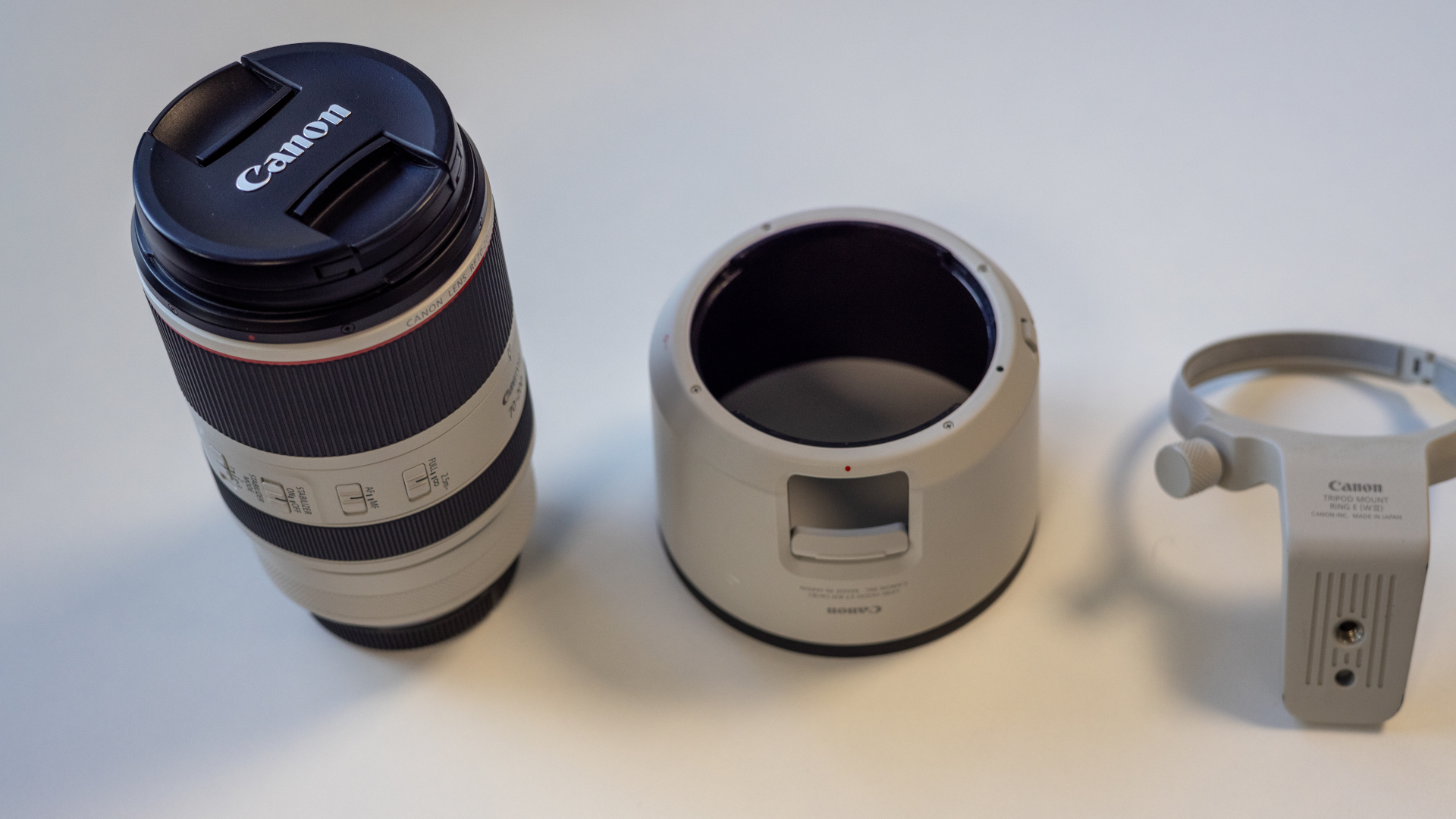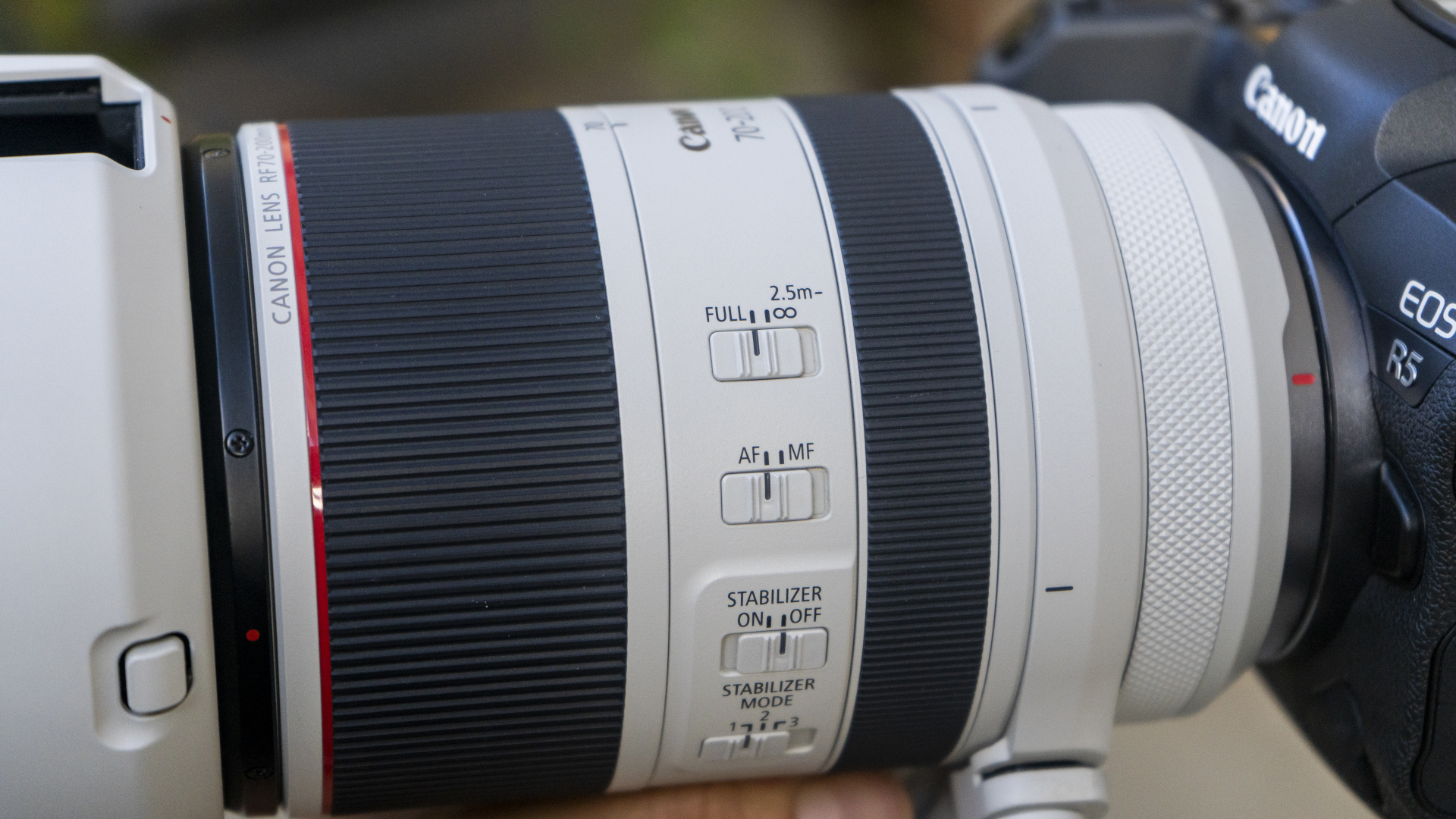Space Verdict
The Canon RF 70-200mm f2.8L IS USM is small, sharp, and steady. It’s almost perfect, but the incompatibility with teleconverters will put off some photographers.
Pros
- +
Stunning image quality
- +
Swift, silent autofocus
- +
Sensible button layout
Cons
- -
No teleconverter compatibility
- -
Telescoping zoom design
Why you can trust Space.com
The Canon RF 70-200mm f2.8L IS USM was the final lens to be released as part of Canon’s “trinity” of essential R-series optics in November 2019. Following the Canon RF 15-35mm f/2.8L IS USM and RF 24-70mm f/2.8L IS USM, it was welcomed by Canon users who had moved to the mirrorless system wanting a versatile pro zoom in their kitbag.
Type: Telephoto zoom
Compatibility: Canon RF mount
Focal range: 70-200 mm
Aperture range: f/2.8 - f/32
Thread size: 77 mm
Weight: 2.36 lbs
The Canon RF 70-200mm f2.8L IS USM is undoubtedly one of the most compact telephoto zooms of its kind – around two-thirds the weight of the Canon EF version for DSLR cameras. But this small sizing comes with a big price at $2799. And if you've just splashed out on one of the best cameras for astrophotography, you might wince at having to pay this much for a lens to accompany it
For the money, however, the lens delivers a bright f/2.8 aperture (which excels for low-light shooting), up to eight stops of stabilization, plus a nifty rear control ring that can be customized to allow you to tweak exposure settings from the lens itself.
We paired the RF 70-200mm f2.8L IS USM lens with the Canon EOS R5 and tested it in a range of scenarios to see whether the design, handling, and image quality really does make it one of the best zoom lenses for Canon owners.
Canon RF 70-200mm f2.8L IS USM lens review: Design
- Window to adjust filter position
- Custom lens control ring
- Extending rather than internal zoom

Canon describes the RF 70-200mm f2.8 lens as super compact, and it really is so much smaller than the equivalent Canon EF 70-200mm f/2.8L IS II USM lens (27% shorter and 28% lighter, to be precise). Even with the supplied tripod mount and hood attached, it can fit comfortably in a street-style camera bag and will have no problem slotting into any of the best camera backpacks.
Canon has achieved the magic downsizing of this RF lens by changing the zoom mechanism, which telescopes in and out externally rather than happening inside the barrel like the EF version. The design enables the lens to collapse to its smartly compact form, but it also shifts the camera’s center of gravity closer to your eye, making it easier to use handheld thanks to better balancing.

On the downside, the telescoping design feels akin to the cheaper kit lenses that come bundled with cameras, rather than a premium optic, which isn’t helped by the slightly plasticky build quality of the barrel. Fortunately, the weather-sealing is on par with Canon’s other elite L-series glass.
Breaking space news, the latest updates on rocket launches, skywatching events and more!
The biggest problem with the lens design is that the rear glass element is only about a centimeter from the back of the lens at 70mm, leaving no physical room for a teleconverter to be added. 70-200mm is a focal length that photographers will often extend with a 1.4x or 2x converter, and not being able to do so here feels like a major limitation.

On the lens itself, the five switches for focus and stabilization are sensibly located and easily reached. There’s also a new control ring at the base of the lens which can be set up to change ISO, aperture, and shutter. While this is a helpful addition, it’s easy to inadvertently change settings if you handhold the lens close to the mount. When zooming in and out there’s just the right enough resistance throughout the focal range, so there’s no problem staying fixed at one specific focal length.
The included, optional lens hood is well-made, and features a brilliant trick: a small window which can be opened to allow you to adjust the position of filters such as a polarizer without having to take the whole hood off.
Canon RF 70-200mm f2.8L IS USM lens review: Performance

The Canon RF 70-200mm f2.8L IS USM packs a punch in every area, which you’d expect for a lens at this price point.
Autofocus is powerful, thanks to the introduction of twin Nano USM motors – seen here for the first time in a Canon lens. Continuous AF is almost eerily quiet when in both stills and video modes, which is a real advantage when shooting flighty wildlife subjects or a wedding ceremony where being unobtrusive is key.

We were testing the lens on the Canon EOS R5, making it possible to get up to eight stops of stabilization overall. In low light conditions you really do notice the five-stop image stabilizer at work, and there’s arguably more need for the stabilization modes in video mode, which is fantastic especially when you get to the longer focal lengths.
In terms of image quality, the results are just beautiful. Center-frame sharpness – what the lens can resolve in the center of the frame – peaks at f/4, but you get pleasing results even when shooting wide open at f/2.8. The corner sharpness isn’t quite as high, but still remains consistent throughout the range of focal lengths and apertures.

Contrast is also solid from the center right to the edges of the frame. When you shoot wide open some vignetting creeps in, but it’s not major and easily fixed in post-production. The bokeh on this lens is also gorgeous, becoming an attractive feature when capturing images in low sunlight.
Should you buy the Canon RF 70-200mm f2.8L IS USM lens?
If you’ve got a Canon mirrorless camera and plan to stick with the system for some time, the Canon RF 70-200mm f2.8 is a very worthy investment. Canon has the zoom pegged for travel, wildlife, news, and sport, but the focal range is so versatile that it’ll likely suit whatever genre you throw at it. The bright constant aperture facilitates shooting even when the light levels drop, and if you prefer working handheld over a fixed tripod position, the built-in image stabilization modes should help.
Like the rest of the trinity RF lenses, it slightly outperforms the EF equivalent in sharpness, stabilization, and also size, allowing you to work for a day of shooting without feeling sore the next day. Unlike the EF version, however, it won’t work with Canon’s RF teleconverters. And that’s a major downside if you’re a pro photographer who needs to get closer to animals or athletes.
If this product isn’t for you
If your budget doesn’t stretch to the Canon RF 70-200mm f2.8, try the slightly cheaper and lighter version: the Canon RF 70-200mm f/4L IS USM.
If you need a lens that is easily compatible with teleconverters, try the Canon EF 70-200mm f/2.8L USM with a Canon EF to RF Mount Adapter.
Want a wider focal range, but only want to carry one lens? The Canon RF 24-240mm f4-6.3 IS USM lens offers a massive 10x zoom.

Lauren is a photographer, writer and editor based in the Cotswolds, UK. An experienced journalist who has been covering the industry for over ten years, she's equally adept at putting the latest camera through its paces or learning a creative shooting technique and then passing that knowledge on in an accessible way. Lauren holds a degree in Natural History Photography and has plenty of real-world experience in a variety of disciplines, from astrophotography to wildlife, weddings, and even commercial portraiture. Lauren is the Managing Editor of Digital Camera World, having previously served as Editor of the global publication Digital Photographer, a practical-focused magazine that inspires hobbyists and pros alike to take phenomenal shots and get more from their kit.

